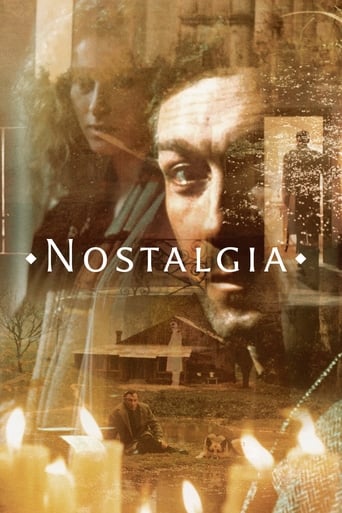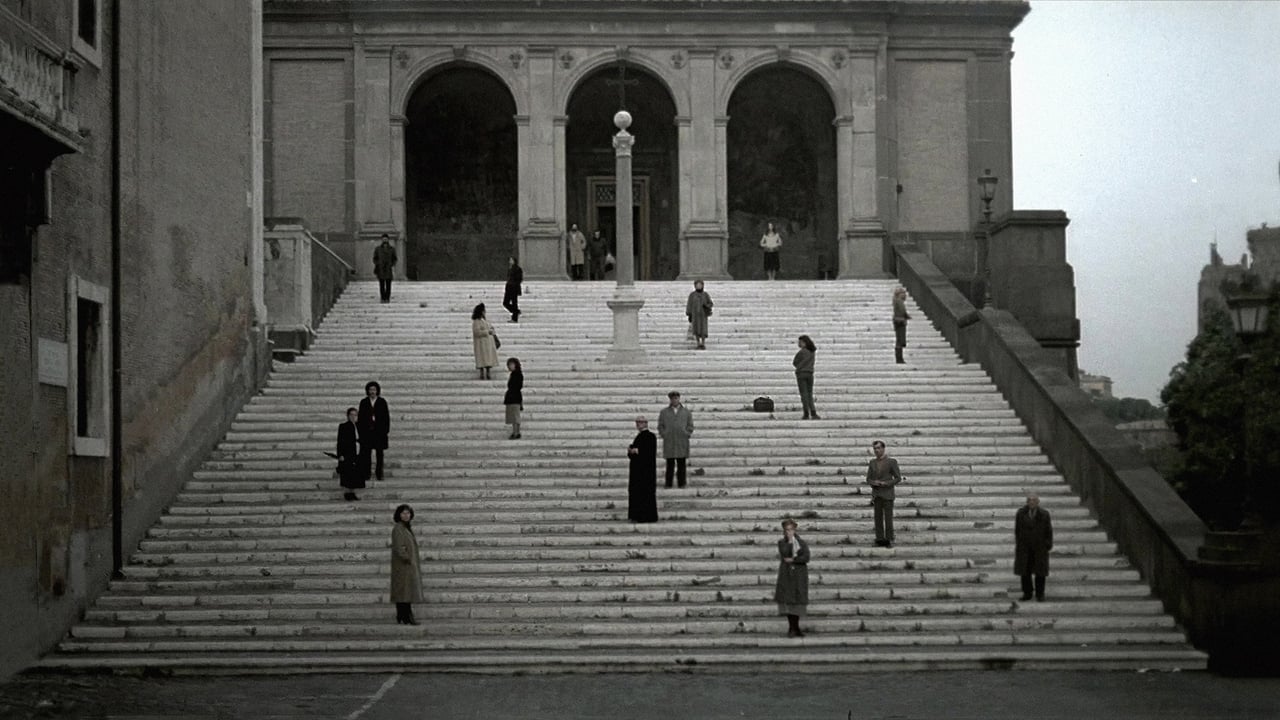EyesWideClockwork
A searing, heartbreaking love letter to Russia. This film should be seen; a film that reaches deep into your soul. It's pure, as Tarkovsky was. The images alone, with no words, can profusely affect me, and can leave you close to tears of beauty. Isn't this Tarkovsky at his most ethereal, and transcendent? The shots move ever so slowly, like waves, pulling in from the tide, slowly lapping on the shore...this is what it reminds me of. It feels very holy, and delicate; like a forbidden fruit; something that we should not be able to see, but, alas, we have had a chance to gaze upon it. It feels as if every slow step, and movement, is a painful and melancholy step into deep, lost memories. The language here, in this, is a rare moment in life, to witness such profundity; here, maybe one of Tarkovsky's Magnum Opus, we see him elevate to the highest transcending level, of language and alike; of one who understands the world deeply, and passionately. Surely, the opening scene is one of the most beautiful humanity has witnessed. Domiziana Giordano here externalizes beauty, almost like a goddess; ethereal. On the screen, we are witnessing paintings.. There's really no other film like Nostalgia. There are so many scenes here that are extraordinary. Words can't begin to describe the fire scene, juxtaposed with Beethoven; words can't capture the essence of this scene in the way Tarkovsky's images can. The candle scene may sear itself into your subconscious; slowly, but it will be there. Tarkovsky has the gift of bringing the beauty, from ordinary things; to make them beautiful, if not more than normally considered beautiful things; it shows he sees the world in a different way, a special way; someone who is truly alive. It truly is in another dimension. The romance, and relationship in the film is pure, powerful, and melancholic; it is awe-inspiring to watch these conversations; they are truthful, and can leave you gasping, as you have never seen emotions, quite portrayed in such a way. The film also brings into question human advancement; how we have come so far from our simple years, when we were merely in nature itself; humanity has changed, and with this, comes the many problems we have now; anxiety and worry plague many; alienation creeps on our minds; because life is so quick now, and everyone must become something important; the pressure is great; a far cry from our simpler days.
CinefanR
Visually beautiful film about alienation and faith. Slow paced, with the exquisite photography and unconcealed philosophical dimension that have become Tarkovski's trademark, "Nostalghia" demands attention and ultimately delivers. The famous "candle scene" is a poetic, striking and exasperating visual representation of faith, redemption and the artist's mission. "1+1=1", "Ode to Joy", the girl's speech, Domenico's plea- all these will remain with you for a long time.Tarkovski's movies don't seem biased; they don't make categorical statements, but raise questions that remain mostly unanswered. For Tarkovski, the movie is a search, a personal catharsis. It's true that Tarkovski speaks through all his characters, but what he has to say deserves attention. This won't be your typical "entertainment", but a thought-provoking and fascinating journey into the mind of a great film maker.
loukosrotten
One has to be very careful when reviewing this film. I think it would be arrogant on my behalf to say I have understood in all possible aspects and conceived all the meanings Tarkovsky was trying to deliver. And I really doubt anyone can, unless he's a genius as big as Tarkovsky. This movie talks about love, hate, art, faith, about everything, about life. It softens your heart and sharpens your brain leaving you with a deep sensation of having spent your time well and thinking about it is time well-spent as well. As for the artistic part, the way he chooses to depict his opinion, to pose his questions, to demonstrate his doubt and his emotions of hope or loss(especially his nostalgic feelings of his motherland Russia combined with his love for Italy his exile land) is far more than moving: it's flawless.
Graham Greene
Nostalgia is essentially a dream play that opens with a hazy, monochromatic vision of tranquil reflection, which, not only establishes the core themes behind the film's title, but also, informs the key emotional sequences that are here revisited by the central character throughout. As a result of this, the film is as much about the feelings of loss and longing as it is about the lead character, the homesick Russian poet Andrei Gortchakov, who is exiled in Italy with his guide and translator Eugenia on a research mission into the life of a long-forgotten, 18th century composer. In the hands of any other filmmaker, this plot would give way to a series of grand adventures and curious revelations, but, as we've seen in other films, like the majestic Mirror and Andrei Rublev, Tarkovsky is a filmmaker unconcerned with the external world of the film, who, instead, turns his attentions inward, to chronicle the internal angst and emotions at the heart of these tortured, complicated souls.As is always the case with Tarkovsky's work, it could be argued that the film has further shades that somehow draw parallels with the filmmaker's own life and works; with the exiled main character here becoming the (cinematic) voice for Tarkovsky's own feelings of loss and nostalgia during the making of this film. Because of this, the cinematic depiction of the small Italian village where the film takes place is one of the gloomiest and most barren creations ever presented, especially in comparison to the kind of lush, summery vistas that we're used to seeing from this particular, geographic region. The locations used are desolate, dilapidated, over-run with moss and ivy, and swept in a constant haze of fine rain and morning fog, which allows the filmmaker to create a number of slow and haunting visual meditations that further the actual plot... but also help to visualise the inner-turmoil felt by Gortchakov at this difficult crossroad in his life. As is always the case with Tarkovsky, the visual design of the film is meticulously created and deeply hypnotic, with the production design creating an emotional labyrinth for the characters, which is then, rigorously explored by the camera.The use of cinematography is always an important factor is Tarkovsky's work, because it is so vital in creating and (then distinguishing between) these varying layers of reality, fantasy, memory and premonition - with the filmmaker employing a variety of techniques, from cross cutting between sepia-tone and defused colour, and the juxtaposition between regular speed and slow motion. The use of those slow, mesmerising zooms (bringing to mind Kubrick's masterpiece Barry Lyndon) and those complicated tracking shots only add to the lingering tension and escalating melancholy that is perfectly established throughout the film's lethargic first act. The film is deliberately slow, like the majority of this filmmaker's work, with the camera moving at it's own pace in order to linger and meditate on certain images and moments. The editing too is deliberate in it's pace, with a number of scenes unfolding with a minimum of two to three cuts per scene (Tarkovsky always allowing the slow movement of the camera to do much of the work normally covered by the editing), which can, on occasion (particularly the first viewing), become quite tiresome. It does, nonetheless, ultimately tie in with the inner feelings and emotions so synonymous with the title and, is integral to the inner pain felt by our central characters.Into the mix of things we also get a dose of the mystical, supplied here by the character of Domenico, another tortured soul who's back-story involves keeping his family hostage for a prolonged number of years under fear that the world would end. Domenico, like Gortchakov (and indeed, Tarkovsky), is another one of those haunted souls, inhabiting an earth they don't really understand, whilst questioning their place in the world and the world within the cosmos. Towards the end of the film, Domenico will rant atop a statue about all manner of deep theoretical issues, before Tarkovsky launches into two of the most astounding sequences he ever created. The first is a brutal and literally jaw-dropping act of emotional and physical catharsis (set to the strains of a distorted Beethoven), whilst the other is a long and slow meditation on fate (and probably the most iconic scene in this film), involving an empty pool, a lighted candle, and a weary, heartbroken Gortchakov.Nostalgia is a deep and thoughtful film, best suited to those viewers who are interested in spending some time with a film that takes a great deal of time to fully reveal it's self. Like the majority of Tarkovsky's films, it is bleak, dreamlike and hypnotic, in the way in which the images just linger on the screen, waiting to be decoded. Some might be frustrated by the slow pace and the reliance on character over narrative, however, if you are an admirer of Tarkovsky's best films, like Andrei Rublev, Mirror and The Sacrifice, then you'll be sure to find something of interest here.


 AD
AD




